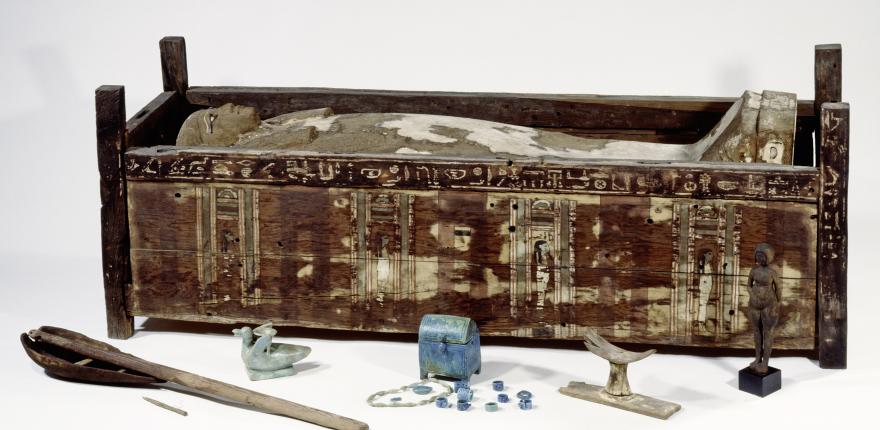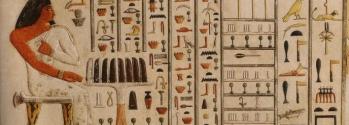

What is Egyptology?
Egyptology is an academic discipline that specialises in the study of ancient Egypt. It focuses on the archaeology, language, literature, history, religion, and art of that culture, but in recent decades the geographical scope of the field has been expanded to include research into Nubia (modern northern Sudan), which maintained close links with Egypt and had cultural affinities with it for several millennia.
Academic Egyptology can be said to have begun with the decipherment of important portions of the hieroglyphic script by Champollion in 1822; however, before Champollion Cambridge alumnus Thomas Young made important breakthroughs in the run-up to decipherment. It was only in the very late 19th and the early 20th century that Egyptology developed into a programme of study in its own right in several European and American universities. Egyptology is usually embedded within larger departments that either focus on Archaeology, Near Eastern topics more broadly, or Classics. In Cambridge, Egyptology is part of Archaeology and is taught as a stand-alone track within the Archaeology course.
Egyptology at Cambridge
The Department of Archaeology offers papers and modules in Egyptian Language and Egyptian Archaeology at both an Undergraduate and Postgraduate level.
Cambridge Egyptology places equal emphasis on archaeology and text, each contributing to a fully contextualised approach to the field. We prioritise a comprehensive approach to Egyptological research, moving beyond traditional boundaries geographically, chronologically, methodologically and theoretically. Students in Egyptology at Cambridge are exposed to a wide spectrum of research through Cambridge’s broad and diverse Egyptological community and our colleagues in the Department and beyond.
Our core Egyptology staff comprises:
- Dr Kate Spence for Egyptian Archaeology; research projects at Sesebi (North Sudan) and Amarna (Egypt)
- Dr Hratch Papazian for Egyptian language; research projects at South Abydos (Egypt) and Gebelein (Egypt)
We have a vibrant community of post-doctoral and postgraduate researchers, as well as affiliated scholars, undertaking a broad range of Egyptological research.
Tripos tracks
Egyptology
The Egyptology track allows students to study Egyptian language, culture and archaeology in all three years of their course, becoming increasingly specialised as they move through their course.
In first year, students take papers A3 Introduction to the Cultures of Egypt and Mesopotamia and E1 Egyptian Language 1. Two further papers can be chosen from those offered to Archaeology students in Part I (this includes options from the HSPS Tripos).
In second year, students study papers E2 Middle Egypt Texts; two archaeology courses will be offered from the following options: A27 Settlement and Society in Ancient Egypt; A28 Ancient Egypt in Context: An Archaeology of Foreign Relations; A29 The Archaeology of Religion in Ancient Egypt; and A30 The Archaeology of Death and Burial in Ancient Egypt. Students also take course A2 Archaeology in Action (if this was not taken in first year), or course A10 Archaeological Theory and Practice.
In third year, students take paper E3 Old and Late Egyptian Texts and two papers from A27–30 (see above) that were not taken in second year; one of these papers can be replaced with paper E4 Coptic. All Egyptology students write a dissertation in their third year. This provides a wonderful opportunity to undertake a piece of original research on a topic chosen by the student, under the expert guidance of a member of staff.
Egyptology with Assyriology
Students with a particular focus on language can study Egyptology and Assyriology together.
In first year, students on this track take courses A3 Introduction to the Cultures of Egypt and Mesopotamia, alongside E1 Egyptian Language 1 and M1 Babylonian Language, and a fourth paper chosen from those on offer in Archaeology and HSPS.
In second year students take language papers E2 and M2, and choose one archaeology or culture paper from the Egyptian papers on offer, and one from Mesopotamia.
Third year students take language papers E3 and M3, alongside one archaeology or culture paper from each subject area, or they can substitute a dissertation for one of these papers.
Archaeology with Egypt
Students on the Archaeology track can take Egyptian archaeology papers as options in all three years of their course alongside core archaeology options. First years can take paper A3 Introduction to the Cultures of Egypt and Mesopotamia. Papers A27–30 are available as options to second and third year students; two of these papers are taught each year. (A27 Settlement and Society in Ancient Egypt; A28 Ancient Egypt in Context: An Archaeology of Foreign Relations; A29 The Archaeology of Religion in Ancient Egypt; and A30 The Archaeology of Death and Burial in Ancient Egypt.)
MPhil
MPhil in Egyptology
We offer an 11-month MPhil course in Egyptology, catering both for those with a background in Egyptology and for with those with a background in a cognate field. We emphasize the importance of acquiring a broad knowledge of the archaeology, culture and language of Ancient Egypt, alongside focusing on their own research interests and identifying suitable topics for future research.
All students on the course take the paper G19 Landscapes, built environment and material culture of Ancient Egypt, which serves as a core paper for the course. Additional papers are chosen from options in language (introductory or advanced Egyptian language, Coptic and Demotic) and archaeology (Historical Archaeology of Ancient Egypt), and students may also be able to choose a paper from those offered on the Archaeology MPhil.
We ask all candidates for the MPhil in Egyptology to submit a dissertation research proposal of 500-1000 words. Staff are happy to discuss proposals before they are submitted..
MPhil in Egyptian Archaeology
Egyptian Archaeology can be studied within the MPhil in Archaeology track. Students taking this option take the core course G02 Archaeological Concepts, alongside one or two of the Egyptian Archaeology courses on offer (G17/18 Historical archaeology of Ancient Egypt; G19 Landscapes, built environment and material culture of Ancient Egypt).
Candidates planning to write a dissertation on an Egyptian topic are strongly encouraged to submit a research proposal with their application, and are welcome to discuss their proposed research with Dr Kate Spence prior to submission.



